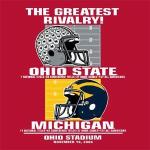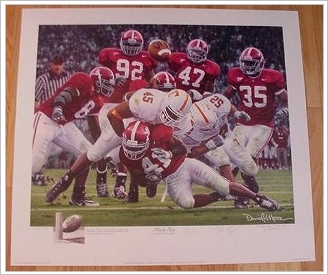
Oakland Raiders' wide receiver Randy Moss had an
interesting explanation when asked why he has dropped so many passes this season:
"Maybe because I'm unhappy, and I'm not too much excited about what's going on, so my concentration and focus level tends to go down when I'm in a bad mood. So all I can say is if you put me in a good situation and make me happy, man, you get good results."
It would be easy to criticize Moss for those remarks. People hate it when others, especially those they don't know, make excuses for under-performing. In that same vein, employees often feel implicit pressure to show up and do a good job at work, even if they are feeling under-the-weather or simply sad.
This seems especially true in the context of professional sports. Just think about what frequently happens when a player "takes too long" to come back from an injury: the player is derided by fans and media as "soft" or "weak." Players' earning capacity can be adversely affected when they develop a reputation for "not playing hurt," a point raised by
Sports Illustrated's Peter King in a
column about former New York Giants cornerback Phillippi Sparks.
Sometimes coaches supply the same criticism. New England Patriots' fans know that all-to-well from 10 years ago, when they heard Bill Parcells' ungracious reply to a question about rookie wide receiver Terry Glenn's hamstring injury: "
She's making progress." Oakland Raiders' coach Art Shell seems just as skeptical about Moss. When asked about Moss attributing his unhappiness to his poor play,
Shell said, "You're paid to play a game you've played for many years and that you love and once you hit the field, you compete. That's the way Art Shell sees it." Aside from referring to himself in the third-person, Shell probably said what a lot of coaches would say:
toughen up, Randy!But if you think about it, don't Moss's remarks make some sense? After-all, we can all relate to being distracted and affected by personal matters or difficult workplace environments, and it's a lot harder to do things in those settings. So why shouldn't Moss use unhappiness as an excuse?
Legal scholars have been thinking about these very phenomena. Just a few weeks ago at the
colloquium on labor and employment law scholarship at Marquette Law School, I heard Temple Law professor
Peter Huang deliver a talk on the implications of happiness research on employment law, a subject that he is writing an article about with Marquette Law professor
Scott Moss (no relation to Randy!). One such implication is that employees are more likely to discriminate others in the workplace when they are unhappy. So happiness really does matter.
That point has also been made over at Health Law Prof Blog, where Cincinnati Law professor
Betsy Malloy cites a study of attorneys' happiness which found:
Lawyers are 3.6 times more likely to be depressed than members of other professions, and it’s not just because their jobs are more stressful. For most people, job stress has little effect on happiness unless it is accompanied by a lack of control (lawyers, of course, have clients to listen to) or involves taking something away from somebody else (a common feature of the legal system).
Books have also been devoted to how happiness can affect our job performance. Daniel Gilbert's
Stumbling on Happiness is perhaps the leading book on the topic. Gilbert incorporates a great deal of social psychology, and explains how what we think makes happy really doesn't, and that actually does make us happy is often beyond our consciousness.
But back to Randy Moss. We know that unhappiness can impair workplace performance, particularly when it is accompanied by a lack of control (and Moss has the not-so-magnificent Andrew Walter as his quarterback: he of the
lowest quarterback rating in the NFL). So is Moss really making an excuse or is he just being honest? Would we rather him say that he is "fully responsible" for the dropped passes when in fact his emotional health may be a real cause? If his fingers were broken--a physical injury--we would certainly understand the dropped passes, so why not let an emotional injury also excuse those drops?





























